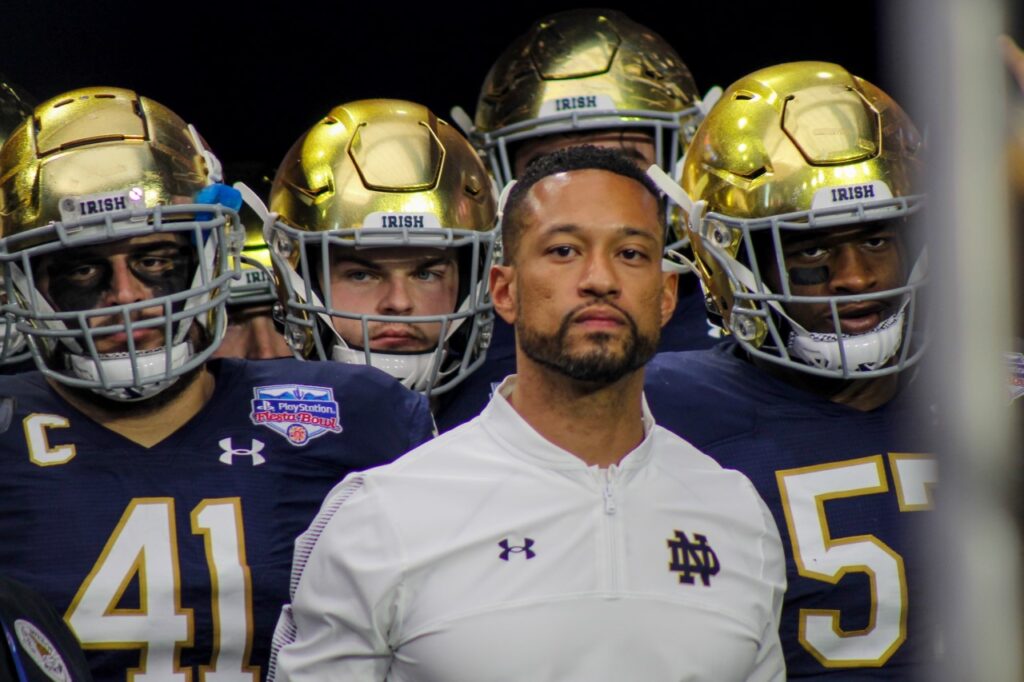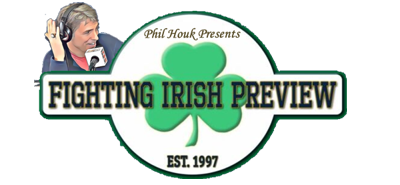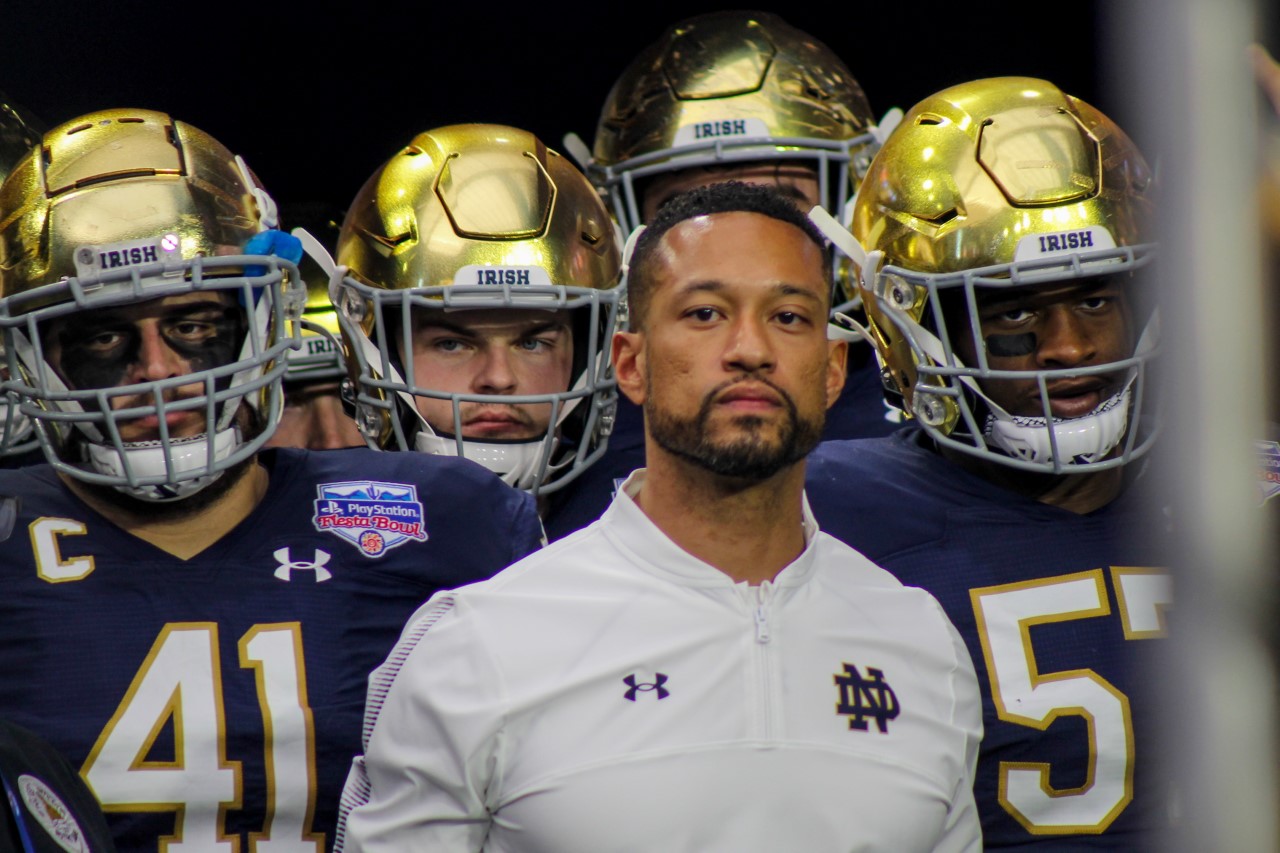
With his 2023 and 2024 recruiting classes currently ranked number one nationally, we know Marcus Freeman can recruit, but can he win? And even more importantly, considering it has been 34 years since ND tasted national championship glory, can he win now?
The records of other Notre Dame first year head coaches, gives us a clue.
Starting with Ara Parseghian, in 1964, there are eight former coaches who faced what Marcus Freeman is about face.
Ara Parseghian set the bar high in his first season at the helm. In 1963 under interim head coach Hugh Devore, the Irish had gone 2-7. The offense had gained a total of 1,980 yards on the season and only 654 yards passing. The Irish program had not been in top 25 in five years.
One thing that Devore did do well was recruit. In an era when freshman were not eligible to play, Devore had brought in a talented class in 1963, one that would eventually produce seven All-Americans.
In the win loss category, 1964 saw a stunning turnaround for the Irish. Parseghian, who had been a success at Miami of Ohio and Northwestern, is famous for having observed that once he got to Notre Dame he had 13 years of experience as a head coach, and needed every one of them. But Ara almost made it look easy going 9-1 and missing out on the National Championship by the margin of a phantom holding call in the season finale at USC.
Ara Parseghian first season verdict: About as good as it gets.
Compared to Ara, Dan Devine had an even longer resume when he took over in 1975. 16 years experience at the collegiate level, and four more years heading up the Green Bay Packers. Parseghian’s last team in 1974 was loaded with talent (but Devine soon lost key players due to suspension and injury). Ara’s last team finished 10-2, champions of the Orange Bowl and number #6 in the final AP Poll.
Nine starters had graduated off of Ara’s last offense, but Devine did inherit a talented defense that would include Steve Niehaus, and Luther Bradley. Devine’s Irish finished 8-3 in 1975 including “upset’ losses to Michigan State and Pittsburgh. The Irish had been inconsistent on offense, perhaps because Devine had failed to fully discover the talents of Joe Montana who only saw spot action during the year. Notre Dame was unranked in the final AP poll.
Devine would go on to lead the Irish to a national title in 1977 and finish with an excellent 53-16-1 record in five seasons, but after what was viewed by disappointing debut in 1975, “Dump Devine” bumper stickers soon became a part of the Notre Dame football world.
Dan Devine first season verdict: passing grade but you better improve soon.
Succeeding Devine was the always with his heart on his sleeve, Gerry Faust. Faust had lots of head coaching experience, but it all had been leading Cincinnati Moeller High School. Faust inherited a talented team from Devine including three all-Americans and a second year starting quarterback in Blair Kiel. Faust, with his outgoing personality took South Bend by storm and hopes among many were high that Notre Dame had found the right balance of charisma and coaching skill to return to the days of Parseghian.
Faust opened his ND career with a 27-3 victory over LSU and the Irish were ranked #1. That was the high-water mark of the Faust era. The Irish finished 1981 at 5-6, their first losing season since Devore in 1963. Whereas the battle cry under the previous regime had been “Dump Devine”, the new battle cry became “Oust Faust”.
Gerry Faust struggled to a five-year record of 30-26-1. He was fired after five seasons. the team he would pass on to his predecessor went 5-6 and the program was badly in need of a rebuild.
Gerry Faust first season verdict: Double secret probation, don’t let it happen again.
Lou Holtz came to town in 1986 with a ton of head coaching experience and a reputation for turning programs around, in a hurry. He quickly figured out that Tim Brown was a pretty good player and he built the Irish around him. Improvement was obvious in the first game back at home against #3 Michigan, the Irish matched the Wolverines hit for hit, but came up one point short, 24-23. Close losses became a habit as the Irish finished Holtz’s first season 5-6 Four of those six losses were by less than a score. Despite the 5-6 record, improvement was obvious. The Irish capped off the season with an exciting 38-37 victory over USC. The next season the Irish were in the Cotton Bowl and in 1988, they won it all.
Lou Holtz first season verdict: Palpable progress, but rebuilds don’t happen over night
Holtz retired after the 1996 season after the Irish went 8-3. Bob Davie, without any head coaching experience was promoted from the defensive coordinator position as the new head coach . Davie did have extensive experience as an assistant Coach, having served many years under Jackie Sherrill at Pittsburgh and R. C. Slocum at Texas A & M. Returning from Holtz’s last team was veteran Ron Powlus at quarterback and Autry Denson at running back.
Preseason the Irish were ranked number #11, but after a narrow victory over Georgia Tech on opening day, the Irish lost four straight and five out of 6. Davie did manage five straight to finish out the year, but lost in the Independence bowl to LSU. The Irish finished 7-6 and unranked. The whispers of “Dump Davie” had started by midseason. Davie went on to a very Faust like five year record at ND of 35-25. In his last season, 2001 the Irish finished 5-6.
Bob Davie first year verdict: not good.
In 2002 after the aborted regime of George O’Leary who was fired a few days after being hired due to discrepancies on his resume, Notre Dame settled on Tyrone Willingham as Bob Davie’s successor. Willingham seemed to check most of the boxes, high energy, disciplinarian, and plenty of assistant and head coaching experience. As the head coach at Stanford he had played the Irish five times going 3-2.
Willingham took South Bend by storm. Out of the box the Irish won eight straight and reached number #4 in the polls. But it was all being done with an opportunistic defense. A win however is a win and the Irish finished Willingham’s first season 10-3. What that meant however is that they had lost three out of their last five. Willingham never really revisited the winning ways of his first season going 5-7 and then 6-6. Recruiting tailed off significantly as well.
Ty Willingham first year verdict: pretty good but with storm clouds on the horizon.
2005 ushered in the era of Charlie Weis. Weis had been a very successful offensive coordinator in the NFL, but lacked Collegiate and head coaching experience. However like Willingham, he won immediately. going 9-3 in season one. Unfortunately his signature “win” was not a win at all. The Irish who had been unranked to start the season had moved to #9 and at mid season in South Bend, they duked it out with #1 USC all the way down to the final seconds, but in a losing effort. A loss made all the more difficult to accept by the Irish faithful because of the infamous “Bush Push” a move that was illegal at the time but it happened on the game’s deciding play.
Weis had taken an offense that had returned 9 starters including Brady Quinn and worked his magic, defensively however, the returning defense was short on talent and experience and it showed all year long. Weis would last five years at ND, but by the time he went 3-9 in his third year the die on his future in South Bend was cast.
Charlie Weis first season verdict: Sign him to a contract extension! (So they did.)
Charlie’s reign came to an end after a 6-6 season in 2009 that included four straight losses at the end. Jack Swarbrick acted swiftly to bring in the hottest candidate in the country. Brian Kelly who had just led Cincinnati to a 12-0 regular season was his man. There was some returning talent from the Weis years, including Manti Teo at middle linebacker, but Kelly’s first team was hamstrung by a lack of solid and experienced quarterback play. Kelly eventually settled on a freshman by the name of Tommy Rees, but the Irish sputtered on the filed losing three of their first four games. The 2010 Irish did manage to play winning football in November going 3-0 and won the Sun Bowl against MIami to close out an 8-5 campaign.
As for as Kelly’s overall success, it is undeniable that Kelly’s teams were almost always solid. They beat the teams they should just about every time, and a solid culture, particularly since 2016 was in place. But in big matchups they faltered. Last year Kelly became the first head coach in ND history to voluntarily leave the University to take over at another college program. Kelly left as the all time winningest Coach in ND history.
Brian Kelly first season verdict: A lot better than 6-6 the year before.
So ring in the era of Freeman. And what everyone wants to know, can Marcus Freeman win now? Taking a look at other first year coaches at ND has given us some clues. The historical gold standard at Notre Dame is Parseghian’s first year when he took a team with a losing record the season before to within an eyelash of a National Championship. Perhaps the worse first year performance since 1964 was the 5-6 mark that put up by Gerry Faust in 1981.
How does Freeman compare going into his first season?
Obviously Freeman is lacking in head coaching experience. Notre Dame fans with much of a memory at all recall Bob Davie (I know that Davie was the first person I thought of last December when Freeman was hired) but the experience of Gerry Faust is also instructive. Neither had head collegiate coaching, neither had much success at ND, both had very dispositioning first seasons at ND.
That may mean that fans can anticipate a rough first season for Freeman. After all opening at Ohio State with BYU, USC and Clemson and more in waiting would test any first year coach anywhere. But, there are some things that work in Freeman’s favor that were not working for Davie or Faust or any other first year ND coach in the last 60 years Thank Brian Kelly is to thank for those factors. Over the last five years Kelly built a consistently winning program with top notch facilities, excellent recruiting and has developed an “expect to win” culture. That is what Freeman has inherited. Obviously this is not a rebuild situation like Lou faced in 1986, the Irish can win now, the Irish should win now.
Freeman’s recruiting prowess is already bordering on legendary. He has secured commitments from athletes that would not have given Brian Kelly much more than the time of day. Kelly’s recruiting was really good, Freeman’s recruiting looks to be elite.
Key to those recruiting efforts is the ability to communicate, and communicate particularly with athletes in the 18 and up age range. This skill undoubtedly translates over to the day to day coaching job as Freeman looks to find ways to get everything possible out of his team.
Another factor working for Freeman is that Notre Dame opened the vault and gave his the ability to assemble what, by all accounts, is an outstanding and experienced staff. From Rees to McCullough to Al Golden and others who have the look of rising stars, this staff is experienced and knows what it takes to win football games.
One other thing that is for certain about Freeman, he won’t be outworked. A comment by him after the first fall practice the other day when asked what his day so far had been like is instructional. “I got here around 5:30 AM something, went on a run, went to my office and prepared for our morning meetings. Had a staff meeting, then had a team meeting, then had a special teams meeting. Went back to my office and prepared for some of my night meetings and some of things I want to do tonight. Went to practice, and now here I am.”
A solid work ethic, combined with a load of talent, outstanding culture, top notch staff and great communication skills puts Marcus Freeman in a position really unlike any other Notre Dam first year coach in the last 60 years.
We’ll start to find out on September 3.

